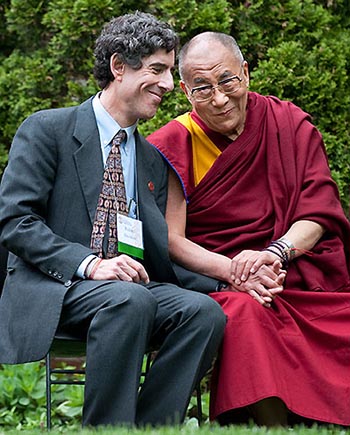Center for Healthy Minds moves into its home

Richard Davidson, left, professor of psychology and psychiatry and director of the Center for Healthy Minds, and His Holiness the 14th Dalai Lama of Tibet share a moment together.
A dream inspired by the Dalai Lama and nurtured by philanthropist Ulco Visser found its home Monday night when Professor Richard Davidson invited guests into the Center for Healthy Minds in the Waisman Center at the University of Wisconsin-Madison.
About 200 guests joined Davidson, the Center’s director, to celebrate the ribbon cutting of the world’s only translational research facility to combine a brain imaging lab and meditation space under one roof. A meditation room with an arched ceiling and indirect lighting is the centerpiece of the 3,600 square foot space. It will be used for research and contemplative interventions.
“A lot of work we do is focused around a discipline we hope will become mainstream: contemplative neuroscience,” Davidson said. The research, based on evidence that shows that even adult brains can physically change, involves nourishing the mind and the heart to promote compassion, kindness and joy, he said.
The Center is committed to basic research and translational research that will move discoveries into the community, Davidson said. Researchers will be “working with real people in real contexts, where we have the opportunity to make a real difference.”
Several researchers presented some of those projects Monday, including contemplative work with war veterans to overcome emotional trauma and with pre-school and fifth grade students to promote compassion and kindness.
The infrastructure and disciplines involved make the Center unique in its ability to do this research, said Visser, chair of the Center’s Strategic Advisory Board and founder of the Impact Foundation. “As a businessman, I’ve been involved in a lot of startups,” he said. “This is the startup essential for all of humanity.”
Provost Paul DeLuca remembered the skepticism in the room when Davidson presented his research 20 years ago and a standing ovation at the end of that seminar. Characteristically, Davidson applied ingenuity and thoughtfulness to establish the Center, he said.
This is not an abstraction. Once you get your hands around it, you’re picking up real tools with which to build the future.
Mark Lefebvre, vice president at the University of Wisconsin Foundation
“This (research) is so real,” said Mark Lefebvre, a vice president at the University of Wisconsin Foundation. “This is not an abstraction. Once you get your hands around it, you’re picking up real tools with which to build the future.”
The Foundation is committed to creating partnerships and consortiums to support the Center, he said.”The adventures ahead are dependent on all of us working together.”
The roots of the Center lie in the Dalai Lama’s 1992 challenge to Davidson to bring the rigorous techniques used to study negative qualities of mind to bear on the positive qualities of healthy minds. The resulting research led to the development of contemplative neuroscience, a hybrid discipline that uses science to study the impact of contemplative practices. The Dalai Lama remains a supporter of the Center, visiting Madison in May for the grand opening and donating $50,000 to support its research.
In 2007, Visser asked Davidson, “What’s your dream for the rest of your career.” The Center is the result, and the Impact Foundation was its lead donor.
Jon Kabat-Zinn, founder of the Center for Mindfulness in Medicine, Health Care and Society at the University of Massachusetts Medical School, led the first meditation session in the new Center in late October, when 30 mindfulness researchers gathered to discuss their work.
